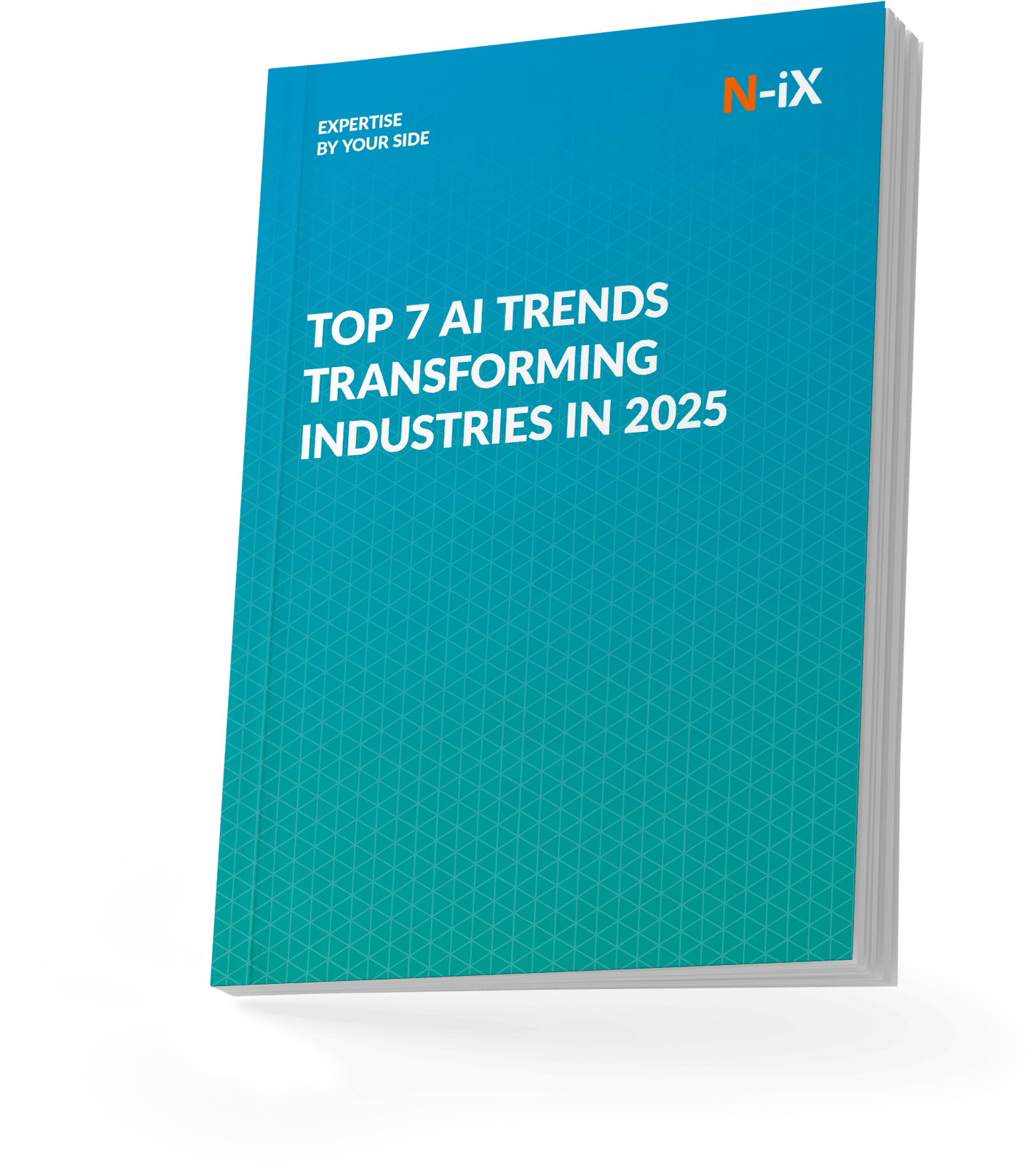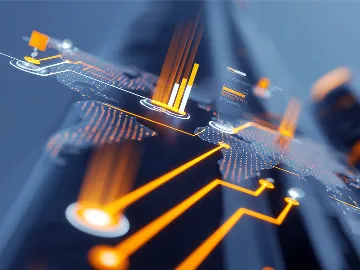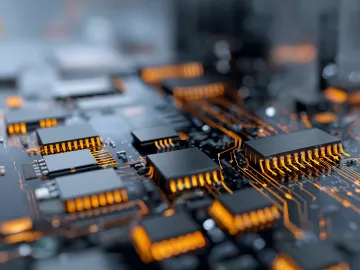As businesses seek to adapt to evolving demands, powerful trends in IT outsourcing are reshaping how organizations leverage technology to optimize operations, enhance security, and deliver exceptional user experiences. Advancements in software engineering enable the creation of scalable, flexible, and innovative IT outsourcing solutions. Let's explore the most significant IT outsourcing industry trends and see how businesses can derive tangible benefits from them.
Boosting efficiency with AI and ML
AI has arrived as a game-changing technology, reshaping how businesses operate across industries. From automating repetitive tasks like data entry and customer service to delivering personalized services, AI reduces costs and improves outcomes. In November 2024, the AI market globally is worth $747B, a 45% increase from $515B in 2023 [1]. This sharp increase reflects AI’s dominant position among IT outsourcing trends, its growing adoption, and the attractiveness of investment in AI technologies. Let’s look at the top three trending AI use cases:

Advanced data processing
AI's advanced data processing capabilities enable rapid analysis, pattern recognition, and decision-making across diverse domains. Predictive analytics empowers businesses to forecast market trends and understand customer behavior, allowing them to refine strategies and make informed decisions in real-time. In cybersecurity, AI enhances fraud detection by rapidly identifying unusual patterns and preventing breaches before they escalate. Natural language understanding extracts meaningful insights from vast amounts of text data, improving customer service interactions and enabling more nuanced sentiment analysis.
In healthcare, Generative AI leverages diverse patient data and advanced imaging analysis to detect early signs of serious conditions, such as cancer, Alzheimer's, and diabetic retinopathy. Automating the interpretation of X-rays, MRIs, and CT scans speeds up diagnostics, enabling earlier interventions and significantly improving patient outcomes.
Read more: Improving user experience of a P2P review platform with Machine Learning and NLP
Reporting and compliance automation
AI in reporting and compliance automation streamlines report creation, validation, and submission while ensuring adherence to regulatory standards. It also automates data collection, cross-referencing, and analysis, reducing manual errors and saving time. AI tools can identify inconsistencies, flag potential compliance risks, and adapt reports to meet specific regulatory requirements across jurisdictions. Additionally, they generate clear, tailored reports for internal and external stakeholders, providing real-time insights and ensuring transparency.

Deloitte projects that implementing intelligent automation could reduce costs by an average of 22% and increase revenue by 11% within the next three years [2]. In capital markets, Generative AI can cut the time spent creating pitchbooks by 30% [3].
At N-iX, we help enterprises stay ahead of the curve regarding technology trends, be efficient, and provide top-tier customer experience. For instance, N-iX helped a large provider of prepaid cards and current accounts from the UK develop an ML-powered solution that automates and streamlines the company’s transaction processing, reduces manual work, and optimizes operational expenses.
Keep reading: Automating transaction handling in finance with Machine Learning
Personalization
73% of US consumers expect improved personalization today [4]. AI empowers businesses to meet these expectations effectively. In IT outsourcing trends in ecommerce, AI-tailored product recommendations are the most impactful trend. Algorithms analyze customer data to deliver personalized and timely product recommendations. Additionally, virtual shopping assistants powered by Generative AI engage customers in real-time across websites, apps, and social platforms, offering instant support, personalized guidance, and consistent service to meet the growing demand for convenience, immediacy, and tailored experiences.

However, ecommerce is not the only industry benefiting from personalization: banking, insurance, healthcare, and other domains are seeing extraordinary boosts to their ability to retain customers and cross-sell products.
Explore the AI landscape of 2025—get the guide with top trends!


Success!

Fostering digital trust
Digital trust refers to systems that grant users confidence in digital systems to protect their data. As businesses increasingly rely on digital platforms, establishing digital trust becomes essential for customer engagement and operational efficiency. Here are the biggest IT outsourcing trends in digital trust systems:
Biometrics
Biometric technology has been around for quite some time, but its primary focus today is on creating seamless and secure user experiences. The Pandemic significantly accelerated the adoption of touchless biometric technologies, like facial recognition and iris scanning, as people sought safer, contact-free solutions. At the same time, traditional measures no longer meet the modern security standards. In the financial sector, biometrics are increasingly being integrated into authentication processes for banking services and payment systems. This shift aims to enhance transaction security while minimizing fraud. As biometric systems continue to improve in accuracy and reliability, they are becoming an essential component of modern security infrastructure.
Identity and Access Management (IAM)
Identity and Access Management (IAM) systems are software solutions designed to manage digital identities and control access to enterprise resources. They handle user authentication, enforce access policies, and ensure that only authorized users can access specific systems or data.
These systems simplify user onboarding and offboarding processes, automate role-based access control, and generate audit trails to support compliance efforts. Incorporating multi-factor authentication and biometrics, IAM solutions enhance security, boost operational efficiency, and help organizations meet data protection and privacy regulations.
N-iX experts assist in selecting suitable cybersecurity solutions, estimating the budget, and implementing key processes like access provisioning, vulnerability, incident management, etc. We also provide cloud security review and implementation of the zero-trust network concept.
Benefiting from advanced connectivity
Advanced connectivity is the seamless integration and interaction of devices, applications, and services over networks, enabling data exchange and development of more complex services. The Internet of Things (IoT), microservices, and APIs are three key technologies driving advanced connectivity. These technologies allow businesses to create interconnected systems that enhance scalability, flexibility, and innovation across various industries.
Microservices
Microservices is an architectural approach to software development where applications are composed of small, independent services that communicate with each other through well-defined APIs. Each microservice focuses on a specific functionality and can be developed, deployed, and scaled independently, allowing for greater flexibility and agility in software development. This modular structure enables faster innovation, easier maintenance, and improved scalability compared to traditional monolithic architectures.
One notable use case of microservices is in big modernization projects. In financial services, monolithic applications can be broken down into microservices to allow teams to work on different components simultaneously, reducing time to market for new features. Additionally, microservices can be scaled individually based on demand, optimizing resource usage and reducing costs.
Internet of Things (IoT)
IoT connects physical devices like sensors, appliances, and machinery to collect and exchange data over the Internet, often automating processes without human input. This technology enhances businesses by delivering real-time insights, boosting operational efficiency, and enabling innovative, data-driven services.
For example, IoT supports asset tracking in factories, as well as monitoring tools and products to improve inventory and workflow. It also powers fleet management by using GPS and diagnostics to optimize routes, track fuel usage, and enhance driver safety.

N-iX has extensive expertise in IoT development, providing a wide range of services from validating your idea and building a prototype of your hardware to designing scalable cloud architecture. For example, N-iX has developed a full-stack IoT solution for industrial fleet tracking and management for an international company specializing in smart telematics solutions. Our solution allowed our client to certify the product and engage new customers.
Also read: 6 hottest IoT trends in 2024: using the power of connected devices
APIs
Software applications can communicate through APIs, streamlining service integration, enhancing data accessibility, and allowing businesses to expand their platform capabilities. APIs are a trend in IT outsourcing that opens new revenue streams and helps provide improved user experiences. For example, under Open Banking, banks provide APIs to fintech companies, enabling them to build apps that access customer account data (with consent) for budgeting, investment, and payment services.
API integration is a crucial part of many projects we deliver. For instance, in the financial sector, we have successfully implemented Open Banking APIs for many of our clients. In the logistics and supply chain industry, we have integrated a Google Cloud-based IoT platform and existing customer services for a client's OEM-based Linux connectivity gateway.
Wrap up
Technological advancements are fundamentally reshaping business operations and driving innovation across industries. From AI and advanced connectivity solutions like IoT and microservices to secure systems such as biometrics and IAM, these technologies are enabling businesses to enhance efficiency, improve customer experiences, and ensure data security.
References
- Fortune Business Insights
- Automation with intelligence, Delloite
- How corporate and investment banks are tackling gen AI, McKinsey 2023
- IBM Global AI Adoption Index
Have a question?
Speak to an expert




